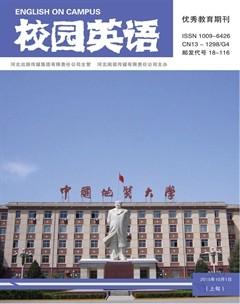Chinese Loan Words in English
郜战莹
【Abstract】English language is the most common working language.In the history of its development,English has widened its vocabulary by borrowing.Borrowing plays an important role in the formation of modern English.Chinese loan words are a part in the family of all the loan words.Therefore,the number of loan words which originate from Chinese is not that great,but they hold an important role in contemporary English.
【Key words】borrowing; loan word; important role
Introduction
English has a vocabulary of more than one million which contains two parts,native and loan words.Words which are originated in Anglo-Saxon are native words; while loan words are those which are adopted from different languages.
I.Loan Words
Modern English is the product of the historical development.Therefore,it is easy to find its clues in the past.The most important historical factors of English vocabulary have been the ease with which it has borrowed words from other languages and then adapted to its own.
1.1 Definition of Loan Words
Loan words are words adopted by the speakers of one language from a different language.A loan word can be called as a borrowing(Zhang Yunfei,2004).
1.2 Types of Loan Words
Usually borrowings are classified as follows: denizen,alien,and translation-loans(Crystal,2008).A denizen is a word borrowed from another language with their pronouncing and spelling assimilated by the language which borrows the words.Such as Tofu,Kai shu,Kongfu.Aliens are loans with unchanged pronunciation and spelling such as Pingyin,Mao Zedong,Beijing.A Translation loan is a new word or phrase constructed by taking a foreign word or phrase at the model and translating it morpheme such as “paper tiger”.
II.The Reasons for Chinese Loan Words into English
The Chinese loan words influence the English languages deeply,whose history into English has already over hundreds of years.The earliest communication between Britain and China can be dated back to 1637(Wang Rongpei,2002).
2.1 Historical and Political Reasons
The Opium War is the starting that loan words on history and politics entered into English.Finally,the Chinese history changed greatly,and this led to the fact that many Chinese loan words reflecting the changes of Chinese society came into English,such as:taiping,dazibao and so on.
2.2 Cultural Reasons
The relationship of language and culture is close.The most important character of human culture is its broadness.Therefore,culture is made of not only natural environment,but also living manners,food and living tools(Sapir,1985)
III.Features of Chinese Loan words in English
Chinese and English belong to the different systems of language,so they are quite different in terms of spelling and writing.
3.1 Pronunciation Features
In the history,like Guangdong,Fujian,are main areas which began to contacted with western world earlier.Most of the overseas Chinese come from these places,so many words are given about through this way,which is the foundation of the loan words.While Putonghua has been the official language variety,so most of Chinese loan words borrowed in this way.
3.2 Writing Features
The way of writing changes a lot with the development of society.At the beginning,there is no any fixed writing way first proposed by Thomas Wade,and writing ways only adjusted itself to adopt to the changing environment.
Conclusion
Therefore,its concluded that its inevitable to widen the vocabulary one language by borrowing words from other languages.Recently,because of the rapid development of modern mass media and internationally cultural exchange,English has already borrowed many words from other languages.Chinese loan words have appeared in English for a long time through history,politics,and,culture.These loan words possess their own features in pronunciation,spelling to meet the demands of English.
References:
[1]Crystal.D.English an a Global Language[M].Cambridge university press.2008.
[2]Sapir,Edward.An Introduction to the Study of Speech[M].Beijing.
[3]Foreign Language Teaching and Research Press.1985.
[4]汪榕培.英语词汇中汉语借词的来源[J].四川外语学院学报.2002.
[5]张韵斐.现代英语词汇学概论[M].北京:北京师范大学出版社.2004.

